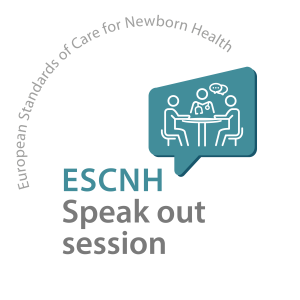

Introducing our latest initiative for 2024 – the ESCNH “Speak out session”! To speak out means to express one’s opinion openly and without fear. With our “Speak out sessions”, we want to create a safe and inclusive space for dialogue and exchange, opportunities to learn from one another, and build bridges and strengthen community ties.
In these sessions, we invite participants from a diverse field of occupations and interests, including healthcare professionals, medical staff, patient advocates, and parent representatives, to share personal experiences and offer valuable insights on complex topics related to neonatal care and the European Standards of Care for Newborn Health (ESCNH).
These sessions are not only a platform for open conversations but also a means to raise awareness for specific topics within the realm of neonatal care. By providing a voice to those affected, the “Speak out sessions” aim to
Ultimately, we want to improve neonatal care to ensure that every newborn has the best start in life.
We envision these sessions as interactive and engaging live streams and want to create spaces where diverse perspectives contribute to a richer understanding of the challenges and opportunities in neonatal care. To participate, simply tune in to the live streams on our social media platforms.
These sessions will take place 1-2 times a year and offer participants the opportunity to ask questions and actively engage in the discussion. Your voice matters, and we welcome you to join us in shaping the conversation on neonatal care.
We will be back in spring 2025 with our third installment. Details will follow at the beginning of 2025. Thank you for your interest and support!
On 23 October 2024, the ESCNH hosted their second Speak out session about RSV – exploring preventive measures and treatment options for infants and other vulnerable groups.
The session brought together parents, patient advocates, and researchers to share personal experiences and insights into current research on RSV. Extending the discussion to the policy level, the speakers advocated for improved prevention, public awareness, and equitable access to life-saving interventions for vulnerable infants.
Speakers:
All speakers emphasised the critical importance of raising awareness and prevention of RSV, which poses a significant risk to infants and young children. They called for better public health education, improved access to preventative measures like RSV prophylaxis, and an equitable distribution of these resources, especially given that RSV can affect both preterm and full-term babies unpredictably.
The speakers highlighted the need for collective societal responsibility to support families during and after RSV infections, as placing the burden solely on parents is both unrealistic and detrimental. They stressed that while RSV impacts young children acutely, its potential long-term effects on lung health require more research, follow-up care, and public awareness. The session ended with a call-to-action to shift RSV care from a family-centred issue to a broader public health priority.
On 24 January 2024, the ESCNH hosted their inaugural Speak out session, focusing on the emotional impact of (co-)twin loss.
The session brought together affected parents and caregivers to share experiences, raise awareness, and advocate for the necessary support and interventions that can promote healing and resilience.
Trigger warning: The following discussions may evoke feelings of distress or sorrow. We encourage you, especially if you have experienced the loss of a child, to carefully consider the time, place, and manner in which you choose to engage.
Speakers:
All our expert speakers highlighted the unique role of healthcare providers in creating a supportive environment for families, offering comprehensive guidance and leading parents through every facet of care.
They also underscored the importance of structural changes on a macro level to prevent burn-out among caregivers working on the front line. While acknowledging the need for systemic changes, small acts of kindness can profoundly influence parents’ ability to heal from loss.
The diverse panel of speakers emphasised the power of using the family’s voice in advocating for political and structural changes as a key driver for the transformative shifts needed in the healthcare system.
You are currently viewing a placeholder content from Facebook. To access the actual content, click the button below. Please note that doing so will share data with third-party providers.
More InformationYou are currently viewing a placeholder content from Instagram. To access the actual content, click the button below. Please note that doing so will share data with third-party providers.
More InformationYou are currently viewing a placeholder content from X. To access the actual content, click the button below. Please note that doing so will share data with third-party providers.
More Information